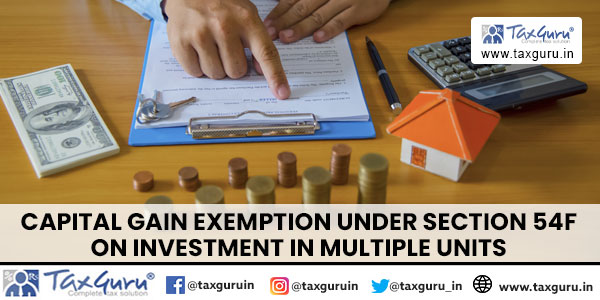The Capital Gain Tax provisions under the Income Tax Act are not very comprehensive, often leaving taxpayers uncertain about their application. The lack of clarity frequently leads common taxpayers to litigation when dealing with taxes on the sale and purchase of capital assets.
One of the debatable issues in Capital Gain Taxation is the exemption on investment of sale proceeds in residential assets.
Sections 54F of the Act allow one to claim exemption from tax on long-term capital gains if the sale proceeds are used for the purchase /construction of a new residential house within the prescribed period.
The point is whether the benefit provided under section 54F, which uses the phrase ”a residential house”, should be interpreted strictly as applying to a single residential unit, or it can be construed more broadly to encompass multiple residential units.
This article attempts to explore various scenarios and provide guidance based on case laws and Judgments.
Scenario 1: Purchase of two flats on different ends in the same Tower of Residential Property: Mrs. Kamla sold a plot of Land and used sale proceeds in the purchase of two flats in the same Tower of Residential Property. These flats were located in Block-A, on two different floors, and on two different ends. It was not possible to combine them, and they could not be used as one single dwelling unit.
Mrs. Kamla is not eligible for complete exemption under Section 54F of the Act, and rather, was entitled to claim exemption only for one of the two flats purchased by her. A residential house under section 54F is not meant to cover multiple residential units and thus exemption is available for one of the flats only: – Delhi High Court in case of Mrs. Kamla v Principal Commissioner of Income Tax (2024).
Scenario 2: Purchase of two adjacent flats: Mr. Nakul purchased two adjacent flats under two independent agreements. The builder originally got the plan approved as two separate units. In order to suit the requirements of Mr. Nakul, the plan was subsequently revised, and also approved by MHADA. The revised plan clearly established that said two flats though independently purchased by him were to be used as a single unit with one kitchen.
Mr. Nakul is eligible for exemption under section 54F. So long as the house was used by the assessee as one single unit, conditions relevant for claiming deduction were fully satisfied and exemption could not be denied under section 54F of Income Tax Act: -. Mumbai Tribunal in case of Nakul Aggarwal v ACIT (2024)
Scenario 3: Ms. Geeta was the owner of the property comprising the basement, ground floor, first floor, and second floor. She entered into a collaboration agreement with M/s Thapar Homes Ltd. to develop the property. The builder demolished the existing structure on the plot of land and developed, constructed, and/or put up a building consisting of a basement, ground floor, first floor, second floor, and third floor with a terrace at its costs and expenses. Ms. Geeta got two independent floors in addition to the cash amount under the agreement with the builder.

Ms. Geeta is eligible for exemption under section 54F for investment in both floors. So long as the assessee acquires a building, which may be constructed, for the sake of convenience, in such a manner as to consist of several units which can, if the need arises, be conveniently and independently used as an independent residence, the requirement of the section should be taken to have been satisfied. Held by the Hon’ble Delhi High Court in the case of Gita Duggal v CIT (2013)
Scenario 4: D. Ananda, an HUF, sold a residential house and purchased two residential flats adjacent to each other under two different sale deeds. However, the seller of the flats has certified that he has made necessary modifications to the two flats to make it one residential apartment.
D. Ananda (HUF) is eligible for exemption under section 54F. After all, the Hindu undivided family property is held by the members as joint tenants. The members keeping in view the future needs in the event of separation, purchase more than one residential building, it cannot be said that the benefit of exemption is to be denied under section 54(1) of the Income-tax Act. Hon’ble Karnataka High Court in case of D Ananda Basappa v CIT (2009)
Conclusion As can be seen from the above scenarios; each case was subject to litigation. The Assessing Officer was reluctant/not willing to accept the assesse purpose of investing in the different units of house property.
The Department is of the general and consistent view that the exemption u/s.54F shall be allowed in respect of a single-house property unit only. It restricts the exemption to a single-house unit and whether more than one of such units are part of a residential house or not, is not a matter of concern for the Department.
It can be concluded that the exact facts of each case determine the eligibility of claims under section 54F.
Disclaimer: The article is for educational purposes only.
The author can be approached at caanitabhadra@gmail.com





